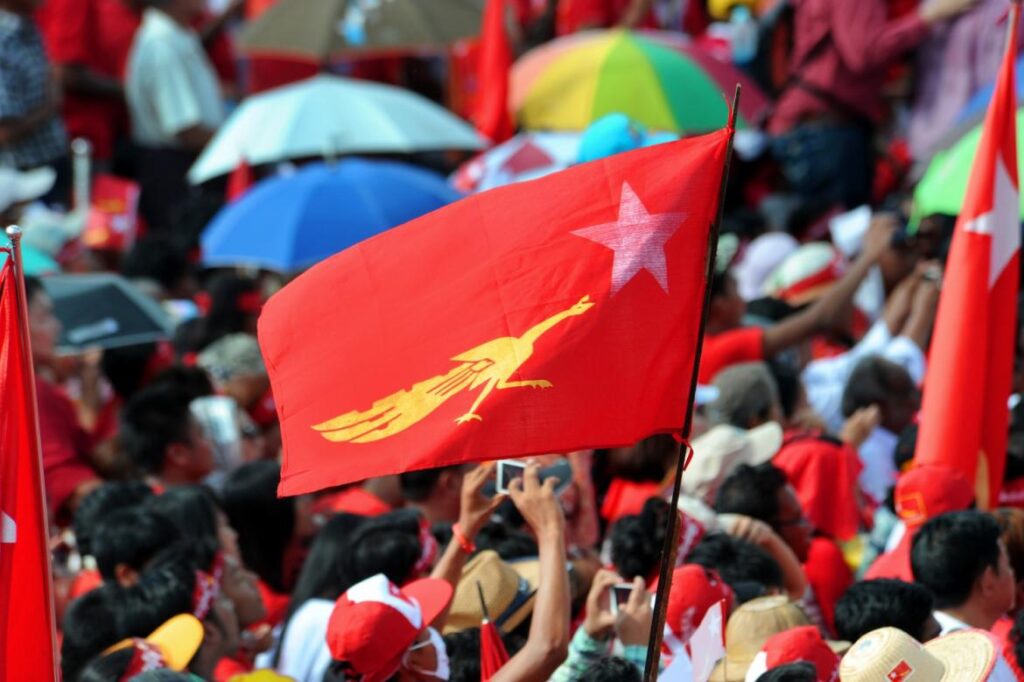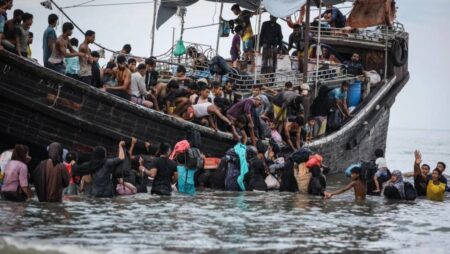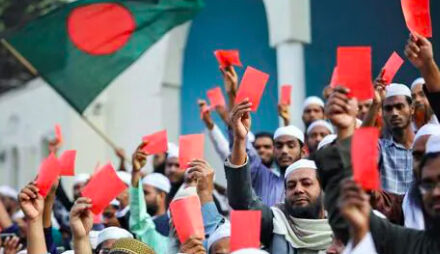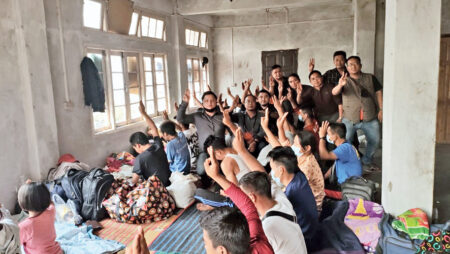MANTRAYA ANALYSIS#65: 7 APRIL 2023
Dissolution of the National League for Democracy: What Next for the Prospect to restore democracy in Myanmar?
BIBHU PRASAD ROUTRAY
Introduction
On 28 March 2023, Myanmar’s election commission announced the dissolution of 40 political parties including the National League for Democracy (NLD) for failing to re-register under a new military-drafted electoral law. In January, the commission, manned by the military junta, had given all political parties two months to re-register under a new law, formulated ahead of the planned fresh polls this year. Amid continued fighting between the military and the opposition, holding of the polls remains highly uncertain. However, the move to ban the largest and the most popular party in the country, which had secured a massive victory in the 2020 elections represents a move to formalize military rule under the garb of a civilian government. And yet, it is not the end game that the military can fully impose on the democratic aspirations of its people.
The Military’s Intentions
There are no real surprises here. Ever since orchestrating the coup on 1 February 2021, the military has been attempting to formally establish a regime that conforms to the ‘of the military, by the military, and for the military’ principle. Only one party—the USDP—conforms to it. The USDP, formed by the military and filled with former military generals and officers, however, is incapable of winning a fair election in which the NLD participates. Hence, the strategy was to ensure NLD’s coercive decimation. In addition to the arrests, prosecution, and in some cases of attempted cooption of the NLD’s top leadership as well as its cadres, the new electoral law brought by the military is a tool to ensure that only the faithful and weak bunch of political entities take part in an absurd theatre that heralds the USDP to power. Under the Political Parties Registration Law announced on 26 January, existing parties got 60 days to re-register or be automatically dissolved. As a result, 40 of the 90 political parties, who either refused to re-register themselves like the NLD or could not meet the Law’s tough conditions stood dissolved.
This, of course, is fairly well-known and has been widely publicized.
What remains relatively less known is the gradual consolidation attempts by senior general Min Hlaing as the most important power centre in the country. Ever since orchestrating the coup, Min Haling has been on a drive to formally make himself the numero uno in the country’s affairs. On 30 March, in the latest reorganisation drive within the military, some of the military commanders and top officers were removed and some others were promoted. Lieutenant General Khin Hlaing was removed from his position as the head of the Bureau of Special Operations 4, responsible for overseeing Karen and Mon states and Tanintharyi Region, following substantial losses in fighting with the Karen National Union (KNU). Major General Nyunt Win Swe, Commander of the Yangon Region Command, was promoted to the rank of Lieutenant General to replace Lieutenant General Khin Hlaing. By periodically chopping and changing the military’s senior generals, he has so far been able to surround himself with a band of loyalists who share the same worldview.
His drive has also involved securing support from a section of Buddhist monks as well as senior and retired generals. The Buddhist Sangha has largely remained detached from the developments after the coup. The military, however, has attempted to embrace and promote the ‘nationalist’ sections of the Sangha by way of conferring titles and monetary grants. In February 2023, Min Aung Hlaing conferred the title of ‘Thiri Pyanchi’ on 17 people including two Buddhist monks, including firebrand nationalist monk U Wirathu. A separate ceremony to present titles was held in Thiri Mingalar Maha Sasana Beikman, a religious hall mainly funded by Min Aung Hlaing in Yangon’s Insein Township. At the ceremony, the USDP donated three million kyats, and Ma Ba Tha and other nationalist groups donated over 70 million kyats to the two Thiri Pyanchi recipients. In the past, Ma Ba Tha has served as a tool in the hands of the military to be used not only against the civilian government of Aung San Suu Kyi, but also against the Muslims and the Rohingya.
Since 2022, the Myanmar Armed Forces Day celebrations in Naypyitaw on 27 March, have featured a special ceremony during which Min Aung Hlaing and his subordinates pay respects to their retired seniors. This year, 19 former military generals including the country’s former president, Thein Sein, joined the ceremony. The ceremony is designed to underline the fact that Min Hlaing still enjoys the full backing of former generals. The dissidents and those who the military think do not support the coup are barred from being a part of the ceremony.
While the monks have given Min Hlaing and his decisions a sanctimonious standing, by choosing to stand behind the senior general, the former generals have endorsed his action. On 27 March, delivering his remarks on the Armed Forces Day, Min Hlaing reiterated that those who are fighting his regime are ‘terrorists’ and they need to be decisively dealt with. “The terror acts of the NUG and its lackey so-called PDFs needed to be tackled for good and all”, he said. The military leader, arguably, could be seeking to cement his place in Myanmar’s political centre stage, as someone like President Xi Jinping of China—the most powerful and whose words are the state’s policies. It is this personal ambition of the senior general that probably constitutes the most formidable challenge to the return of true democracy to the country. Irrespective of the inability of the military to prevail over the opposition during the last two years, it is unlikely that Hlaing would be inclined to change course. In all probability, he would use all the brutal power at his disposal to achieve what he wants.
Challenges for the Military
And yet, the National Unity Government (NUG) of the opposition, led principally by the NLD, continues to remain a formidable hurdle for the military. The NLD, the most prominent political party in Myanmar, has vowed to fight back. It reckons that its popularity, which had translated into an overwhelming victory in the 2015 and 2020 elections, bestows upon it a sense of responsibility to keep fighting. For the last two years, it has been in charge of the NUG, coordinating the armed uprising against the military. Hundreds of loosely organized People’s Defence Forces (PDFs), along with some of the Ethnic Armed Organisations (EAOs) continue to carry out sporadic attacks on the military and its civilian sympathizers. The armed campaign has resulted in more and more areas of the country gradually slipping away from the control of the military. The opposition forces have claimed that they control over half of the country’s territory. Min Hlaing’s statement in February 2023 that of the 330 townships in the country, 132 need security measures somewhat endorses the claim.
The strategy of unleashing a brutal campaign targeting the opposition and their sympathizers have not worked for the military. In the first year since the coup, the UN estimated, in February 2022, 1500 people were killed in the violence unleashed by the military. Year after that, the toll more than doubled, indicating an increase in the military’s brutality to end, in Min Hlaing’s words, ‘terrorism’. In spite of the active military support the junta receives from countries like China and Russia, there is little evidence that it is any closer to vanquishing the opposition.
On the contrary, there are indications that the military could be developing fatigue in fighting the guerrilla tactics of the PDFs and the EAOs. Not surprisingly, the reliance of the military on vigilante groups and state-sponsored private killing squads has grown over the past months. These motley groups, affiliated with the military, have accounted for many killings of opposition sympathizers in urban centres. These groups may have succeeded in economizing the military’s war against the opposition by providing a highly dispensable band of fighters. However, their contribution in weakening the PDFs so far remains highly suspect. The plan to hold the elections, in these circumstances, represents an acute sense of desperation for the military, which seeks to make amends for its losses in the battleground, by hoping to claim victory in a farcical electoral process.
Way forward for the Opposition
The opposition isn’t anywhere closer to victory. However, its ability to hold its ground in the past two years has busted the myths of the invincibility of Southeast Asia’s largest military. A steady increase in the sophistication of its attacks narrates the high morale among its fighters and their sense of determination to defend democracy. It has overcome severe logistical challenges and may also have been able to establish a secure and dependable supply chain for its future activities. It has also been able to gain enormous sympathy and attention worldwide, which is bound to translate into passive as well as active assistance. The dissolution of the NLD, therefore, has little consequence for the NUG.
The coming two months, however, would test its capacity to stand amid adversity. Before the onset of the monsoon, Min Hlaing would upscale the severity of military assault on the PDFs and EAOs with a view to clearing the ground for the elections. The latter will have to withstand the blitzkrieg and focus on continuing their armed campaign, with the intention of not letting the military succeed in its objective.
(Dr. Bibhu Prasad Routray is the Director of Mantraya. This analysis has been published as part of Mantraya’s ongoing “Fragility, Conflict, and Peace Building” project. All Mantraya publications are peer-reviewed.)
To read previous Mantraya Analyses CLICK HERE



